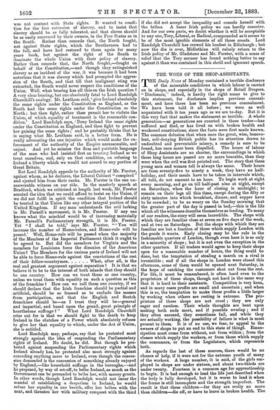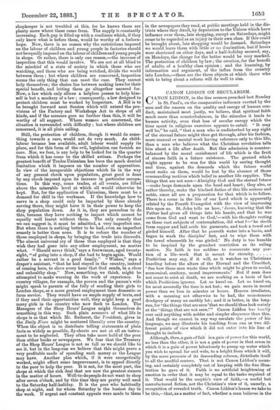THE WOES OF THE SHOP-ASSISTANTS.
THE Daily News of Monday contained a terrible disclosure of the miserable conditions in which labour is carried on in shops, and especially in the shops of Retail Drapers.
"Disclosure," indeed, is hardly the right name to give to this statement, for disclosure implies previous conceal- ment, and here there has been no previous concealment.
We have been told it all before ; we were as well acquainted with it ten years ago as we are to-day. But it is this very fact that makes the statement so terrible. A whole generation—as generations are counted in these trades—has suffered and died, or has lived on with broken health and weakened constitutions, since the facts were first made known.
The common delusion that when once the great, wise, benevo- lent, self-denying British public has its attention drawn to undoubted and preventable misery, a remedy is sure to be found, has once more been dispelled. The hours of labour of Shop Assistants are no shorter, the surroundings in which
those long hours are passed are no more bearable, than they were when the evil was first pointed out. The story that these young men and women tell is always the same. Their hours are from seventy-five to ninety a week, they have no half- holiday, and their meals have to be taken in intervals which, all told, do not amount to an hour. To begin work at eight every morning, and go on till half-past nine at night, except on Saturdays, when the hour of closing is midnight ; to remain on their legs all this time, except during the fifty or sixty minutes into which breakfast, dinner, and supper have to be crowded ; to be so weary on the Sunday morning that the greater part of the day is passed in bed,—this is the life which all the witnesses describe themselves as leading. To many of our readers, the story will seem incredible. The shops with which they are familiar close at seven on five days of the week, and at two on Saturdays. But the shops with which they are familiar are but a fraction of those which supply London with the goods it wants. Early closing may be the rule in the fashionable quarters of London, though even here it is so only in a minority of shops ; but it is not even the exception in the other quarters. If all traders would agree to keep their shops open for a reasonable number of hours, the thing could be done, but the temptation of stealing a march on a rival is irresistible ; and if all the shops in London were closed this afternoon, some of them would be opened next Saturday, in the hope of catching the customers shut out from the rest. For life, it must be remembered, is often hard even to the proprietors of these shops, though not hard in the same way that it is hard to their assistants. Competition is very keen, and in many cases profits are small and uncertain ; and when this is so, the temptation to make these profits a little larger by working when others are resting is extreme. The pro- prietors of these shops are not cruel ; they are only eager and careless. Their whole thoughts are bent upon making both ends meet, and if possible overlap ; and if they often succeed, they sometimes fail, and while they are actually working, the possibility of failure is what is most present to them. It is of no use, we fear, to appeal to the owners of shops to put an end to this state of things. Eman- cipation must come from without, not from within ; from the classes which supply the workers, or from those which supply the consumers, or from the Legislature, which represents both.
As regards the last of these sources, there would be no chance of help, if it were not for the extreme youth of many of the workers. A large number, it is said, of the girls em- ployed in shops are under sixteen, and about two-thirds are under twenty. Fourteen is a common age for apprenticeship to begin. It is bad enough to lead the life just described when the body is fully developed, but it is worse to lead it when the frame is still incomplete and the strength imperfect. The result is that these children—for they are really no more than children—die off, or have to leave in broken health. The shopkeeper is not troubled at this, for he knows there are plenty more where these came from. The supply is constantly increasing. Each gap is filled up with a readiness which, if they only knew what is before them, would be worthy of a forlorn- hope. Now, there is no reason why the restrictions imposed on the labour of children and young people in factories should not be equally imposed on the labour of children and young people in shops. Or rather, there is only one reason,—the increase of inspection that this would involve. We are not at all blind to the mischief of a state of society in which those who are watching, and those who are being watched, divide the world between them ; but where children are concerned, inspection seems the only thing that can meet the case. They cannot help themselves ; the choice lies between making laws for their special benefit, and letting them go altogether uncared for. Now, a law which only allows a helpless person to help him- self is but a mockery of a law ; consequently, a law designed to protect children must be worked by Inspectors. A Bill is to be brought forward next Session which will extend the pro- visions of the Factory and Workshops Act to shops of all kinds, and if the measure goes no further than this, it will be worthy of all support. Where women are concerned, the situation is surrounded with difficulty ; but where children are concerned, it is all plain sailing.
Still, the protection of children, though it would do some- thing towards a cure, would not do very much. As child- labour became less available, adult labour would supply its place, and for this form of the evil, legislation can furnish no cure. Nor, we fear, is any help to be looked for in the quarter from which it has come to the skilled artisan. Perhaps the greatest benefit of Trades Unionism has been the much decried limitation which it imposes on the number of apprentices. In view of the insuperable objections which lie in the way of any general check upon population, great good is done by any check imposed upon its increase in particular occupa- tions. In this way, some trades, at all events, are lifted above the miserable level at which all would otherwise be kept. But, for the application of Unionism, there must be a demand for skill in the workman. If the knowledge how to serve in a shop could only be imparted by those already serving there, they might have it in their power to keep the shop population down. As it is, they are powerless to do this, because they have nothing to impart which cannot be equally well learnt without them. The only remedy that we can suggest is, it must be admitted, a very imperfect one. But when there is nothing better to be had, even an imperfect remedy is better than none. It is to reduce the number of those employed in shops, by bringing the trade into discredit. The almost universal cry of those thus employed is that they wish they had gone into any other employment, no matter what. "Should never think," says a forewoman, aged twenty- eight, "of going into a shop, if she had to begin again. Would rather be a servant in a good family." "Wishes," says a draper's assistant, "that he had stayed in the country, instead of coming here, to slave every hour that God sends, in a close and unhealthy shop." Now, something, we think, might be attempted to make warning do the work of experience. In country villages, for example, the parson and the parson's wife might speak to parents of the folly of sending their girls to London shops, as a more genteel employment than domestic or farm service. They would have an ample supply of texts, and if they used their opportunities well, they might keep a good many girls in the country who now flock to London. The Managers of the Shop Hours' League might themselves do something in this way. Such plain accounts of what life in shops is as that which Mr. Sutherst, the' President, gives in the Daily News might be scattered liberally over the country. When the object is to distribute telling statements of plain facts as widely as possible, fly-sheets are not at all an instru- ment to be neglected. They often take more hold of the poor than either books or newspapers. We fear that the Treasury of the Shop Hours' League is not as full as we should like to see it, but in the long-run we believe that this might prove a very profitable mode of spending such money as the League may have. Another plan which, if it were energetically worked, might effect some improvement, is to appeal directly to the poor to help the poor. It is not, for the most part, the shops at which the rich deal that are now the greatest sinners in the matter of hours. Well-to-do people do not want to shop after seven o'clock, and by this time they are pretty well used to the Saturday half-holiday. It is the poor who habitually shop at night, and for whom Saturday is the busiest day in the week. If urgent and constant appeals were made to them in the newspapers they read, at public meetings held in the dis- tricts where they dwell, by deputation to the Unions which have influence over them, late shopping, except on Saturdays, might come to be regarded as an injury to their own class. If this could be brought about, late shopping would be doomed. Saturdays we would leave them with little or no diminution, but if hours were shortened on other days, and a half-holiday secured, say, on Mondays, the change for the better would be very marked. The protection of children bylaw; the creation, for the benefit of adults, of a healthy class opinion ; and the lessening, by information and argument, of the influx from the country into London,—these are the three objects at which those who wish to bring about a reform will do well to aim.







































 Previous page
Previous page